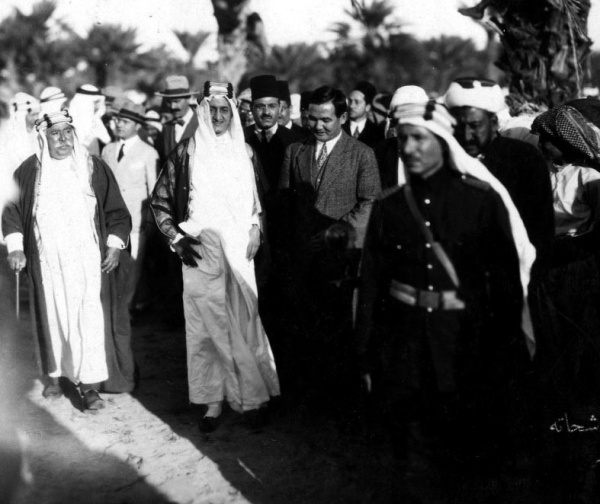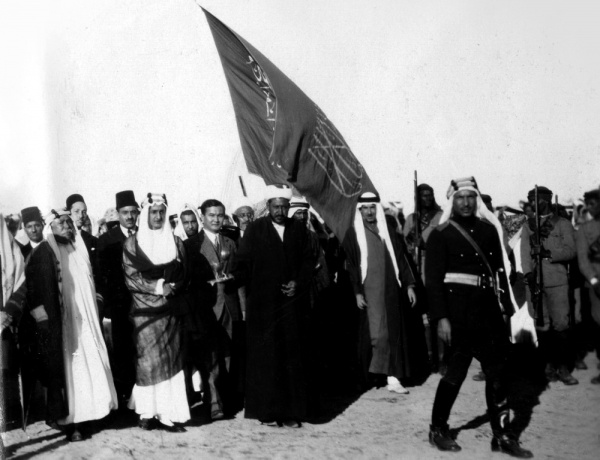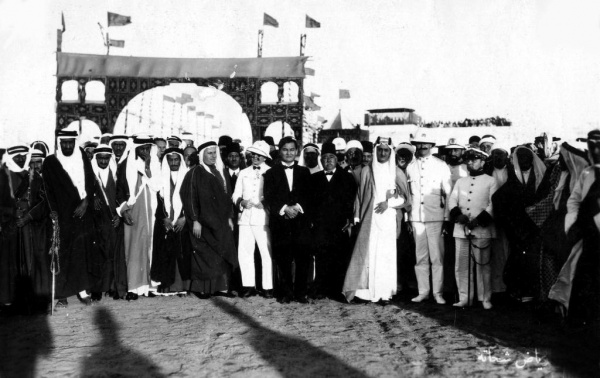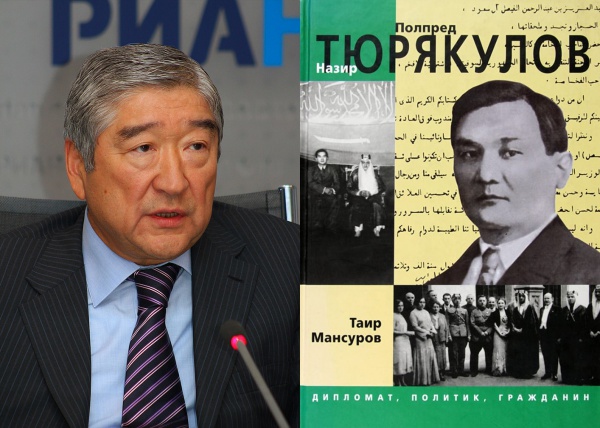“Gas Deal”, the humanitarian mission in the territory of Saudi Arabia, close friendship and personal respect of King and Crown Prince Faisal, warming in relations between the two opposing countries – the Kingdom of Saudi Arabia and the USSR, the organization of the Hajj and assistance to Soviet pilgrims, are the deeds and merits of Nazir Torekulov, a Soviet diplomat, Plenipotentiary Representative of the USSR to the Kingdom of Hejaz, Nejd and the annexed areas, can be listed for a long time. Each of his action and step was thought over thoroughly. Despite his short life (he was shot at the age of 46), Torekulov managed to leave a trace in the history not only of the Soviet Union, but also to become a reference point, an example of a diplomat for the peoples of Central Asia.
The Soviet Diplomat’s Background
The history of national diplomacy tells us that ambassadors’ activities were accompanied by such qualities as kindness, intelligence and unselfishness. These political and state figures, including scholars and writers, were a kind of “connecting link” between different ethnic groups, states and cultures. The tradition of national enlightenment followed inextricably side by side in their tense, often risky service, and such character traits as hospitality, eloquence and perspicacity served to establish friendship and trust in various situations.
Nazir Torekulov, a future Soviet diplomat and USSR Plenipotentiary Representative to Saudi Arabia, possessed all these qualities. He was born in 1892 in Kokand to the wealthy family of a Kazakh first guild cotton merchant. During his school years, he was strongly influenced by his deeply religious mother and his secular father, who spoke Russian very well and expected his son to be involved in educational activities. Charity of such versatile education became Nazir’s spiritual enrichment, creating a unique fusion of comprehension of Muslim mentality and culture with a desire for liberal Muslim bourgeoisie. All this was reflected in his further life when the study of the history of the French Revolution with an interest in the Russian socialist movement was easy for a young specialist.
In 1904, Nazir graduated from a kuttab; and two years later – Russian School for the Population of National Suburbs. In 1914, he graduated from the 8th grade commercial school in Kokand. Thanks to his father’s abilities, Torekulov managed to get a good education. In 1914, he entered Moscow Commercial Institute, which he quit in the third year. The reason for this was the general mobilization of Central Asian peoples for World War I. As a result of that mobilization, hundreds of thousands of Kazakhs, Kirghiz and Uzbeks died without even getting to the front. Nazir made up his mind to leave his studies and go to the front as an instructor of the Zemstvo union, and in fact – as part of the humanitarian mission. Here, he gave up all his strength to provide all possible assistance to the peoples of the East in their national liberation struggle. For this purpose, he even initiated the creation of the organization “Free Steppe”, which was based near Minsk.
It is worth mentioning that Nazir Torekulov actively supported the ideals of the revolution and took part in the establishment of Soviet power. Moreover, he headed the first revolutionary committees, stood at the origins of Turkestan University and generally played a significant role in the development of the Turkestan region.
The path from Kokand to the Presidency of the Central Publishing House
In 1918-19, in Kokand Nazir held the post of the Chief of the District Executive Committee and was the Commissioner of Education and Head of Public Education Department. From 1920, he held a number of government positions in Tashkent: editor of the newspaper “Ishtrati June” (a body of the regional Muslim bureau), the People’s Commissar for Education of Turkestan (1920-1921), the Executive Secretary of the Central Committee of the Communist Party (September – November 1921), the Chairman of the Central Executive Committee of Turkestan (November 1921-March 1922). It was on the post of the Chairman of the Central Executive Committee that Torekulov made a landmark decision: in 1927, he signed a Decree, according to which “in order to provide the broad masses of the indigenous population of Turkestan with the best service by Soviet institutions”, the CEC decided to postpone the weekly day-off to Friday, and at enterprises with mixed national composition to establish it depending on the majority decision. In addition to it, a three-day weekend in honor of the Eid al-Adha holiday was established.
It should be noted that even despite the unfinished higher education and young age, Torekulov was already an authoritative connoisseur of the East, becoming for the authorities not just a knowledgeable and necessary person, but staying as one of their own for the countrymen. As far as Nazir Torekulov’s patriotic feelings are concerned, he based his patriotism on the fact that he was equally dissatisfied with Slavyanophilia and Pan-Turkism, as well as native chauvinism. This belief in him was rooted in his youth, and then became the basis of his worldview, the key to his successful work in politics, journalism and diplomacy. He himself called his worldview “populist” because in his work he proceeded from the needs and aspirations of his and other peoples.
Throughout his work, he paid special attention to educating the masses. This was especially evident during the years when Torekulov served as the Chairman of the Central Publishing House. In 1922, he came to Moscow where he was appointed the Chairman of the Board of the Central Publishing House of the Peoples of the East. Since then, he focused on ideological work in political, scientific, educational, fiction and publicist literature. In six years, the publishing house produced 60 million units of scientific, educational, political and fiction literature in 50 languages of the peoples of the Union. Thus, we can observe that Torekulov stood at the very beginning of the all-Union policy to eliminate illiteracy and educate people. Both teaching and the position of the Deputy Rector of the Institute of Oriental Peoples helped him in this.
He did a lot on this post for development of the Kazakh literature and science. Thus, in Moscow with his help works of previously unknown to the general public Magzhan Zhumabayev were published for the first time. He published classics not only of native Kazakh people, but also copied works of great scientists of different peoples of the Union, including works of Tatar theologian Shigabutdin Marjani. In 1922, he hired Alikhan Bukeikhanov to work in the Kazakh section of the Central Publishing House.
Such purposeful work of Torekulov in the field of interethnic peace and harmony, together with his educational work, personal qualities and level of education (including knowledge of 7 languages, among which there were European ones) led to the fact that at the meeting of the Politburo of November 24, 1927 it was decided “to appoint Torekulov as the Ambassador Plenipotentiary in Gedjas”, more precisely to the Kingdom of Hejaz, Nejd and the annexed areas, replacing Khakimov, who had been working in Jeddah since 1924.
Diplomatic mission to Arabs: establishing a relationship, a cordial friendship with the Prince and the “Gas Deal”
In Stalin’s speech concerning Nazir Torekulov, it was said that “Nazir Torekulov’s outstanding abilities allow him to observe the whole Muslim world from Morocco to Indonesia; his intellectual potential, awareness of the Muslim world and world outlook allow him to hope that such a person can fully fulfill the functions of the Ambassador Plenipotentiary of the USSR”.
As the Union’s Ambassador Plenipotentiary, Torekulov faced a difficult task - to place the entire Muslim world, the center of which was the Middle East, in the Soviet ideology.
Two months later, the 36-year old Soviet diplomat of Kazakh origin found himself in Saudi Arabia. He presented credentials from the Soviet government to the King’s son, Crown Prince Faisal, due to the King’s absence in the country.

Ignorance of the Arabic language at that time was not a long problem for Torekulov: after a short period of training, his level of Arabic allowed not only to speak in front of the local audience, but even get engaged in polemics on theological topics. The diplomat strived for intensive direct communication with the King and other crowned persons, establishing a close relationship in the diplomatic corps. His immersion in the language and culture of the Arab peoples came down to everyday trivia. Torekulov was concerned about medical care of the local population. His wife, Nina Levashova, treated the female part of the royal family. In parallel with it, Torekulov insisted on introducing qualified doctors to the diplomatic staff.

Thus, gradually the USSR Ambassador Plenipotentiary to Saudi Arabia was establishing stable and trustworthy relations with the spiritual, religious and secular state elite of the Hejaz. Later he acquired the reputation of a “righteous” Muslim. King Abdulaziz Al Saud called Nazir Torekulov a brother. The Ambassador Plenipotentiary also established good relations with the King’s sons, especially with Prince Faisal. This can be seen from Torekulov’s report sent to Moscow, in which he says: “The historical dispute with the British because of the seniority in the diplomatic corps is considered to be finished in our favor ... At official celebrations I take first place, Rian (British) - second, the French Charge d'Affaires Monsieur Megret - third, Ayul Molck (Persian) - fourth ... Rian is quite correct in treating me like a yeoman”.

The historical turning point in the whole course of the Soviet-Saudi relations was the two events: “Gas Deal”, according to which 50 thousand boxes of gasoline and the same amount of kerosene were delivered to Hejaz, and the official ten-day visit of Prince Faisal to the USSR in 1932 which resulted in the delivery of a telephone station to Saudi Arabia and the opening of training courses for its on-site service. That visit can be considered as one of Nazir Torekulov’s main personal achievements as the Ambassador Plenipotentiary. Moscow understood that it would receive not just the Saudi monarch’s son, but also the heir to the throne. In its turn, Saudi Arabia expected to reach an agreement with the Soviet government on Soviet commodity credits.
One year later, in 1933, Torekulov performed the Hajj. It can be learned among other things, from the notes of the Tatar-Muslim movement figure Gayaz Ishaki: “In the streets of Mecca, with the endless sounds of the horn, a car appeared decorated with red flags with a sickle and hammer. There were two people sitting in it... The younger one was none other than Nazir Torekulov, Soviet representative in Hejaz, member of the Comintern…” Apart from it, he was also active in helping the few pilgrims from the Asian republics of the USSR to perform the Hajj.
But in 1936, Torekulov was recalled from office and returned to the Union. And one year later, on June 15, 1937, he was arrested. Nazir was shot on November, 3 on charges of participation in the anti-Soviet pan-Turkic sabotage-terrorist organization aimed at overthrowing the Soviet power. From that day, the Kingdom of Saudi Arabia terminated absolutely all the relations with the Union for half a century. Is this not a vivid testimony to the authority that the Torekulov had earned among the Arabs, among the entire royal family, by becoming for them not just Ambassador Plenipotentiary, an official, but also a friend and brother...

Researcher of Nazir Torekulov’s life Tair Aimukhametovich Mansurov and his book
Ilmira Gafiyatullina
Photo: Creative Commons
